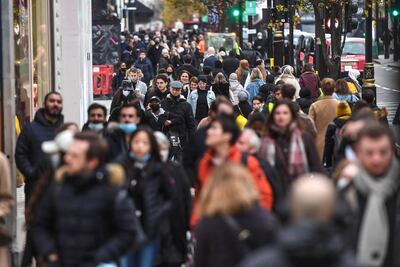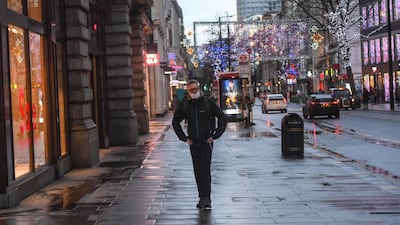British public sector borrowing soared to £34.1 billion ($46.75bn) last month – the highest December level on record – as the government continued to prop up the economy during the Covid crisis.
Government borrowing since the start of the financial year in April reached a record £270.8bn, with the December figure also the third highest monthly borrowing figure since records began in 1993, according to the Office for National Statistics.
UK finance minister Rishi Sunak said the £280bn invested in protecting jobs and livelihoods across the country “has clearly been the fiscally responsible thing to do”.
“But, as I’ve said before, once our economy begins to recover, we should look to return the public finances to a more sustainable footing," he said.
Britain’s economy has struggled since the start of the pandemic after a series of lockdowns to curb the number of coronavirus cases.
In November, the economy shrank 2.6 per cent amid England’s second national lockdown and similar measures in other parts of Britain, forcing Mr Sunak to extend support measures for businesses.
Total public sector debt reached £2.132 trillion at the end of December, equivalent to 99.4 per cent of gross domestic product, the highest since the financial year ending 1962.
“These data highlight how the economy still needs the government’s financial support. The chancellor should ensure that is the main focus of his Budget on March 3 and not a desire to reduce the budget deficit by raising taxes,” said Paul Dales, chief UK economist at capital economics.

Meanwhile, British retail sales saw their largest annual fall in history last year, according to the ONS, falling 1.9 per cent in 2020 from the previous year.
The drop, the largest year-on-year dip since records began in 1997, saw clothing retailers hit particularly hard, with a record annual fall of more than 25 per cent.
The drop came despite December offering partial respite for some stores in the run-up to Christmas, with a brief easing of restrictions allowing stores to open again.
"With less demand for seasonal party wear following the cancellation of Christmas parties and large family gatherings, fashion continued its annus horribilis, with sales volumes still almost 20 per cent below pre-pandemic levels," said Lisa Hooker, consumer markets leader at PwC.
Total retail sales, including fuel, increased 0.3 per cent in December when compared with November, when sales slumped 2.6 per cent during England's second lockdown.
“Although retailers reopened in early December, the poor performance is surely because many were forced to close again from December 20 as some regions were put in tier 4 Covid-19 restrictions,” said Mr Dales.
Food sales were hit particularly hard last month, suffering a 3.4 per cent monthly fall along with department store sales, which dropped 3.7 per cent.
Clothing retailers fared better with a 21.5 per cent rise, reversing all of November’s 19.6 per cent drop.
However, retail sales have performed better than some other areas of consumer spending, with shoppers switching to online stores, where spending surged by 46.1 per cent in 2020.
“While e-commerce has shown that it can replace some of the volume lost during the pandemic, for many purchases nothing can replace the personal experience of visiting a physical store,” said Ms Hooker.
The outlook for January is bleaker with England under lockdown once again and other parts of the country following similar measures. This month the government went further and shut schools as well as non-essential retailers - which most economists think will lead to the economy contracting in the first quarter.
Helen Dickinson, chief executive of the British Retail Consortium, said with no end in sight for retailers closed in lockdown, many will struggle to survive under a mounting rent burden, and a return to full business rates in April.
“The Government should urgently announce an extension to the moratorium on aggressive debt enforcement and offer targeted business rates relief to the worst-affected businesses,” she said.
“Decisive action is needed to save jobs, shops and local communities, with town and city centres looking to be particularly hard hit unless the Government acts now.”
Further data released Friday by IHS Markit showed Britain's private sector activity slumped in January due to the latest coronavirus lockdown and the Brexit fallout, placing the economy on course for a double-dip recession.
IHS Markit's preliminary composite purchasing managers' index (PMI) sank to an eight-month low of 40.6 points, with the shift below 50 indicating contraction, compared with a reading of 50.4 in December.
"A steep slump in business activity in January puts the locked-down UK economy on course to contract sharply in the first quarter of 2021, meaning a double-dip recession is on the cards," said Chris Williamson, chief business economist at IHS Markit.
"Services have once again been especially hard hit but manufacturing has seen growth almost stall, blamed on a cocktail of Covid-19 and Brexit, which has led to increasingly widespread supply delays, rising costs and falling exports."


